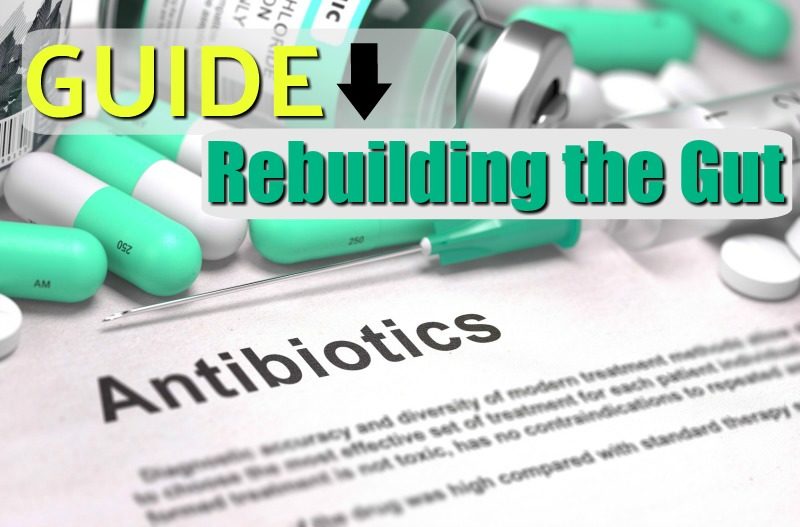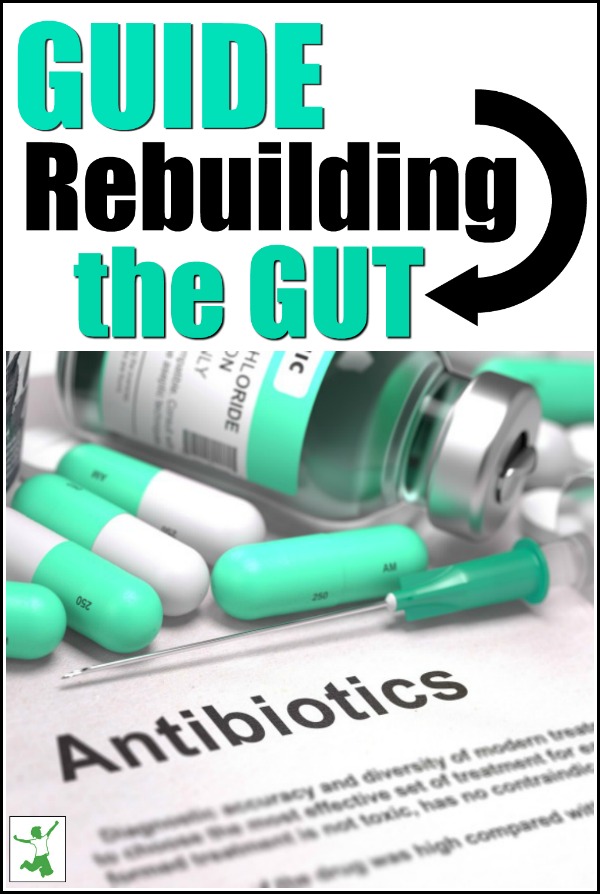
Antibiotics are truly a wonder of modern medicine. Never in a million years did the scientists that developed them think that nearly 100 years later, people would desperately need to take action to repair the gut after antibiotics are taken.
Beginning with the discovery of penicillin by Alexander Fleming in 1928, the pure magic of antibiotics with their rapid resolution of bacterial infections of all kinds caused many in the medical profession to become completely enamored with the drug-based approach to illness. By 1940, antibiotics had come into widespread use causing both doctors and people to gradually forget about tried and true techniques for preventing illness such as the age-old remedy cod liver oil.
This change in the medical paradigm has led in recent decades to abuse of these magical meds and the growing threat of antibiotic-resistant bacterial strains. It has also caused an epidemic of people with compromised gut function due to an imbalanced intestinal environment resulting from excessive exposure to antibiotics via industrially produced foods, medicine, and more recently, groundwater contamination.
While antibiotics clearly have their place in treating life-threatening bacterial infections, their overuse has led to a plethora of modern-day health challenges and autoimmune diseases.
While complete avoidance of all antibiotic exposure would be ideal, it is simply not practical in the majority of cases. Sometimes, antibiotics are necessary and when such a situation arises, it is imperative to protect the gastrointestinal tract from fungal or yeast overgrowth during treatment and to replenish beneficial gut bacteria when the course of antibiotics is complete.
While antibiotics effectively kill both pathogenic and beneficial bacterial strains with the exception of antibiotic-resistant species of streptococcus and other strains, they do not affect the many forms of yeast such as Candida albicans naturally found in the body in a non-dominant role. They also have no effect on the newly emerging super fungus Candida auris.
As beneficial bacteria lining the gut wall are eliminated, yeasts like Candida albicans have the opportunity to overgrow and become dominant by attaching to the gut wall. Once attached to the gut wall, yeast has the ability to create lesions in the cell membranes. This can lead to the syndrome referred to as “leaky gut”, which increases the likelihood of foreign proteins entering the bloodstream resulting in inflammation, food intolerances, a myriad of digestive problems, autoimmune disease, and other associated imbalances.
If you or a loved one find yourself in a situation where antibiotics are critically necessary and cannot be avoided with holistic therapies, the following recommendations for support during and after antibiotic treatment can help minimize the damage to the gut environment and quickly rebuild gut flora at the conclusion of treatment.
Repairing the Gut After Antibiotics
These recommendations are provided to patients of the clinic Biodynamic Wellness which specializes in helping people recover and maintain the optimal balance of the intestinal environment to encourage vibrant health free of chronic disease stemming from a compromised gut. The owner of Biodynamic Wellness, Kim Schuette CN, generously gave permission to share the recommendations listed below.
Please note that these recommendations are helpful whether the antibiotic treatment came from oral medication or IV treatment.
Contrary to popular belief, IV antibiotics also heavily damage gut flora despite the fact that the medication does not make its way directly through the intestinal environment like oral meds do.
Note that colonoscopies devastate gut flora in the same way. Hence, the protocol below is helpful to utilize if you must endure one for whatever reason.

Diet During and After Antibiotics
- Include generous servings of Lacto-fermented dairy and cultured vegetables during and after antibiotics whether oral or from an IV treatment. One tablespoon to half a cup of yogurt, kefir, kimchi, sauerkraut, beet kvass, etc. two to three times daily is advisable.
- Include gelatin-rich foods such as homemade meat stocks and bone broths daily along with abundant vegetables, animal fats, coconut oil, and skate or cod liver oil after antibiotics are completed. Powdered gelatin can be used to further boost homemade soups and sauces.
- Avoid all refined carbohydrates and fruit juices.
Support During Antibiotics
- Saccharomyces boulardii: one capsule twice daily to discourage yeast overgrowth during antibiotic treatment when beneficial gut flora is being compromised.
This particular strain is very important to maintaining gut wall integrity throughout a round of meds and keep Candida in check.
Gut Replenishing Supplements
Note the following probiotic supplements to take and how long to take each to give the gut its best chance to repair quickly.
- After antibiotics (or a colonoscopy), make sure to take a high quality probiotic. Suggested brands are listed on my Shopping Guide which I often re-vett for ingredient changes. Take twice daily for 60 days ideally after meals.
- Saccharomyces boulardii: one capsule twice daily to discourage yeast overgrowth during the gut flora recovery phase. Be sure to continue for 30 days.
- Note that not all beneficial bacteria are created equal for repairing the gut. Be sure to match specific probiotic strains to the function you wish it to perform and the ailments you are working to resolve.
This short video summarizes the protocol.
More Information
Are Antibiotics Always Necessary for Strep Throat?
The 11 Best Natural Antibiotics and How to Use Them
Why Antibiotics Today Could Threaten Your Life Tomorrow
How to Kick Strep Throat Faster and Better Without Antibiotics








I cringe to think back on my annual consumption of a Z-Pak when I used to get such horrible respiratory infections.
I took lots of antibiotics as a teen for acne and at the time, it seemed like the only thing to do. Now I am paying for it.
We found avoiding antibiotics lead to healthier kids 🙂 Breastfeeding is a better solution.
I have found Colloidal Silver is a much better substitute to antibiotics.
Thanks for sharing this important info! Probiotics are so vital to our immune systems, and Anitbiotics are just one of many things that attack them!
I have had what I thought looked like white spots on my throat without a positive strep swab result. It would of been awesome to of had that singer gotten a swab done while right there at the doctors to confirm it was strep. Viral sore throat can hurt badly for days as well. When I get true strep it comes on HARD and super fast…. it doesn’t gradually get worse over a couple days and my throat swells so bad I can barely get water down it’s scary. I would try to do these things to fight it off but I think it would be a little scary.
Does it matter if you take the probiotics at a meal time or not?
Everyone should read this!
My husband had brain surgery and was required to do a round to prevent infection. It was only two days, thank goodness, it could have been much longer! I have been doing some reading about recovering the gut. I was wondering why you never recommend Garden of life supplements. I found online that there is some question as to if a soil based probiotic is indeed healthy to our systems. Garden of life is pretty expensive at 55 dollars per bottle (90 pills). What is your reason for Bio-Kult verses Garden of life?
Glad my friend showed me this site. Would GREATLY appreciate any tips/ suggestions on my condition. I have been dealing with health issues for almost a year and a half now and I am only 25. It all started with intense stomach pain, nausea, and vomiting. After going to the doc one of the first things they diagnosed me with was hypothyroidism. They thought it was an intestinal infection so I was put on 2 different kinds of antibiotics, not knowing the consequences. CAT scan showed inflammation that looked like colitis or crohns, but 2 scopes later my results are more or less normal. I have been “diagnosed” with IBS post infection, chronic gastritis, GERD, and dumping syndrome. I have also developed more autoimmune/neuro type symotoms such as brain fog, migraines, tingling/crawling sensation throughout my body, involuntary muscle spasms, and floaters in both my eyes. I am very against takings meds since nothing has helped. All I take daily is my thyroid med, birth control, probiotic (Florajen), and 2 caps of Miralax nightly. Recommendations on drs or products/foods to take?? I live near Milwaukee, WI.
Hi. I am studying nutritional medicine and would like to offer some recommendations based on my studies. Let me know and I can private message you.
I am curious to know where you are and what you do>
Were you ever tested for Lyme disease? Your symptoms are the perfect match for that.
I also recommend being tested for Lyme disease.
I am healing from Lyme Disease and these are the classic symptoms. I have them.